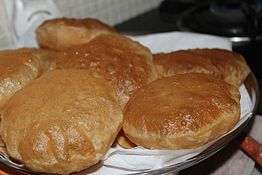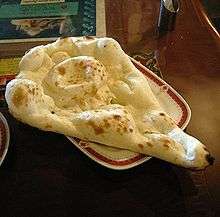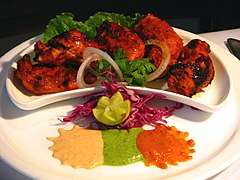Puri bhaji
|
Puri Bhaji with (left to right) coriander chutney, potato bhaji, red onion and pickle in an Indian restaurant | |
| Course | Breakfast, Lunch, Snack |
|---|---|
| Place of origin | Indian subcontinent |
| Associated national cuisine | India, Bangladesh, Pakistan |
| Main ingredients | Puri, Aloo Bhaji |
| Variations | Chole bhature |
Puri bhaji (sometimes spelled poori bhaji) is a dish, originating from the Indian subcontinent, of puri (deep-fried rounds of flour) and aloo (potato) bhaji (a spiced potato dish which may be dry or curried).[1] It is a traditional breakfast dish in North India.[2]

Many Indian households prefer puri bhaji and other traditional dishes over cereals for breakfast.[3][4] Some serve it for lunch along with condiments such as dahi (yogurt) and salad.[5] In central India, puri bhaji is served as a street snack.[6] Puri bhaji is a vegetarian dish and is popular in India because it is relatively inexpensive and tasty. The dish is also served on railway platforms in India and Pakistan[7] and is served as a packed lunch on trains along with pickle.[8] Puri bhaji can also be served with halva.
References
- ↑ Brians, Paul (2003). Modern South Asian literature in English. Greenwood Publishing Group. p. 237. ISBN 031332011X.
- ↑ Saxena, Rajan (2009). Marketing Management 4E. Tata McGraw-Hill Education. p. 248. ISBN 0070144915.
- ↑ Baisya, Rajat K. (2008). Changing face of processed food industry in India. Ane Books Pvt Ltd. pp. 171, 172. ISBN 8180521664.
- ↑ Tharoor, Shashi (2006). India: From Midnight to the Millennium and Beyond. Arcade Publishing. p. 281. ISBN 1559708034.
- ↑ King, Niloufer Ichaporia (2007). My Bombay kitchen: traditional and modern Parsi home cooking. University of California Press. pp. 202, 203. ISBN 0520249607.
- ↑ Dalal, Tarla (2000). Chaat Cookbook. Sanjay & Co. p. 46. ISBN 8186469621.
- ↑ "Jan Ahaar scheme gets going at rly station: Puri-Bhaji for Rs 10". The Indian Express. 17 March 2011. Retrieved 4 April 2012.
- ↑ "'Janata khana' a hit with rail commuters". Times of India. 20 July 2009. Retrieved 4 April 2012.


